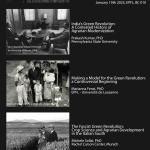India’s Green Revolution: A Contested History of Agrarian Modernization
Prakash Kumar, PhD, Pennsylvania State University
The 1960s “green revolution” of India has become the ultimate marker of the nation’s process of agrarian and rural modernization in the twentieth century. The green revolution of India, in fact, symbolizes a contested process of agrarian and rural modernization with a history going back to the colonial times. Active entanglements between the United States and the Indian subcontinent from the colonial to post-colonial times provide the spine of this talk by Prof. Kumar. The talk will invoke the frames of colonial modernity and post-colonial development and modernization while looking at histories of reforms, institution-making, technocratic adventures, and subject-making to highlight the different sinews of the making of India’s agrarian modernity in a historical perspective.
Making a Model for the Green Revolution: A Controversial Beginning
Marianna Fenzi, PhD, EPFL - Université de Lausanne
In 1943, the Rockefeller Foundation launched a pioneering agricultural project in Mexico which became a model of international agricultural development in other countries in the Global South. This project’s ambitious aims were not achieved and it marked the controversial first steps of the Green Revolution, a period rich in scientific debates on alternative approaches to crop improvement. This talk will focus on scientific approaches that have often been overlooked in favor of the Green Revolution’s powerful, homogenizing imaginary. We will also discuss how North American scientists have used the MAP as an experimental and model program to study plant genetic diversity and as an opportunity for stock landraces, viewed as essential tools for agricultural progress.
The Fascist Green Revolution: Crop Science and Agrarian Development in the Italian South
Michele Sollai, PhD, Rachel Carson Center, Munich
In 1925, the fascist regime launched the “Battle of Wheat”, a plan of agricultural intensification aimed at achieving self-sufficiency in wheat, Italy’s main food crop. Key to this project was the replacement of traditional wheat landraces with “elite” semi-dwarf and early-maturing cultivars released by Italy’s star plant breeder Nazareno Strampelli. While Strampelli’s “miracle seeds” spread rapidly in fertile and wealthy northern Italy, they met with several challenges in the semi-arid and poor Italian South. By delving into these challenges and into the variety of approaches that Italian crop scientists developed in response, the talk will make the case for viewing fascist agrarian modernization as a fundamentally non-linear and contested historical process. Through this case study, the talk will discuss key themes in the growing literature on green revolutions such as the relationship between science, politics and agribusiness, techno-optimism and agroecological concerns, plant breeding and agrobiodiversity.
The seminar will take place on January 19th at 10 AM at EPFL in Building BC room 010 and for those who cannot attend in person please write us and we will send you a Zoom link. A convivial lunch will take place afterwards at the FoodLab restaurant inside the EPFL campus.




